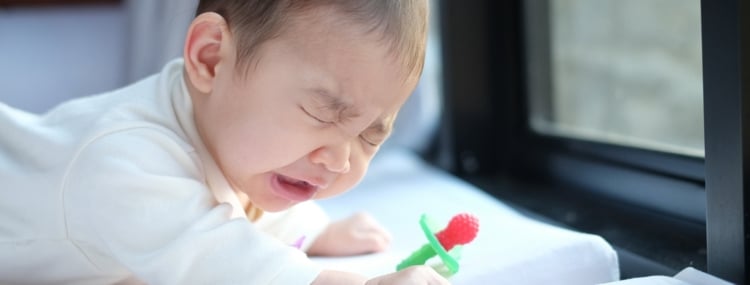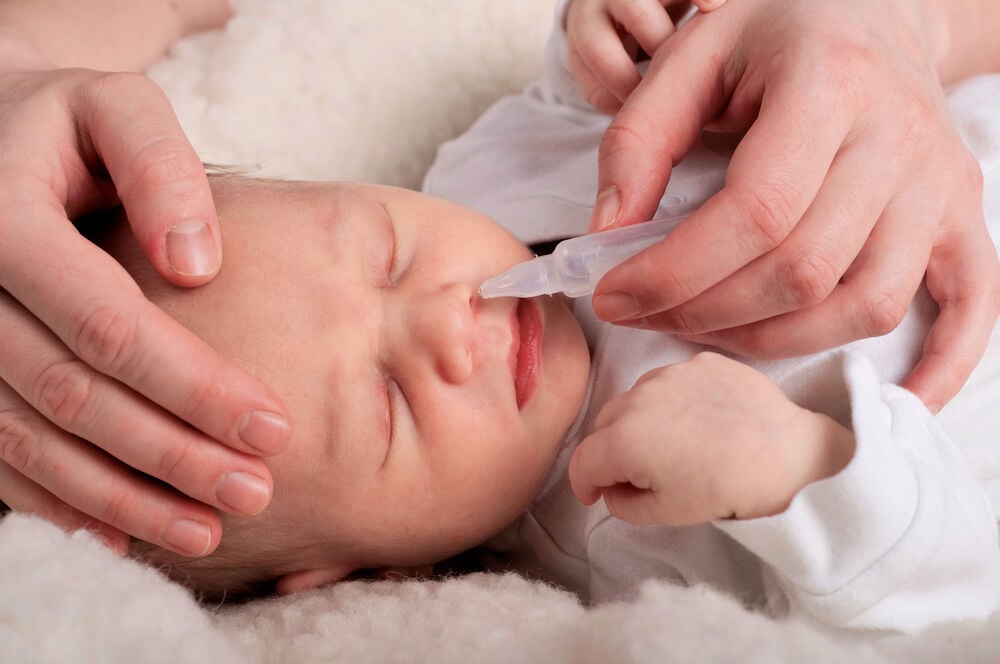Parents of newborn babies often find it difficult to know what’s normal baby behavior and what isn’t. Often, newborns sneeze much more often than adults and even older kids. It helps babies deal with stuffy noses. But infant congestion isn’t the only reason for a baby sneezing. Read on to learn why babies sneeze a lot and when it might be a sign of illness.
-
Tracking cycle
-
Getting pregnant
-
Pregnancy
-
Help Center
-
Flo for Partners
-
Anonymous Mode
-
Flo app reviews
-
Flo Premium New
-
Secret Chats New
-
Symptom Checker New
-
Your cycle
-
Health 360°
-
Getting pregnant
-
Pregnancy
-
Being a mom
-
LGBTQ+
-
Quizzes
-
Ovulation calculator
-
hCG calculator
-
Pregnancy test calculator
-
Menstrual cycle calculator
-
Period calculator
-
Implantation calculator
-
Pregnancy weeks to months calculator
-
Pregnancy due date calculator
-
IVF and FET due date calculator
-
Due date calculator by ultrasound
-
Medical Affairs
-
Science & Research
-
Pass It On Project New
-
Privacy Portal
-
Press Center
-
Flo Accuracy
-
Careers
-
Contact Us
Infant Congestion: Why Do Newborns Sneeze So Much?

Every piece of content at Flo Health adheres to the highest editorial standards for language, style, and medical accuracy. To learn what we do to deliver the best health and lifestyle insights to you, check out our content review principles.
Why do babies sneeze a lot?
There are various reasons for a newborn sneezing a lot. Sneezing implies that their nervous system is working properly, since sneezing is a reflex controlled by the nervous system. It’s completely normal for newborn babies to sneeze more frequently, along with yawning, spitting up, hiccuping, burping, and gurgling.
Newborn sneezing is a reflex that occurs upon irritation of their nasal passages, similar to when adults sneeze. Since the nasal passages of newborns are smaller than those of adults, they can get clogged easily and need to be cleared more often. Newborns sneeze to remove mucus, smoke, dust, and breast milk from their nose.
Newborn sneezing is also a natural way that babies protect themselves against the large number of germs they are regularly exposed to. Sneezing helps clear out the particles and germs that try to enter their nasal passages.
Why do newborns have stuffy noses?
There are a wide range of causes of a newborn’s stuffy nose. These include:
- A runny nose and stuffy nose due to nasal congestion or a cold.
- Amniotic fluid that entered the nasal passage during birth that can take a few days to clear up.
- Deep breaths, causing turbulence in the nasal passages, can make the breathing of a newborn sound stuffy. It’s normal for newborn breathing to be shallow at first, followed by a few pauses and then deeper breaths.
- Regurgitated milk that entered the nasal passage and caused mild swelling. This can happen because infants often have reflux during the initial months of their life.
- Babies’ nasal passages contain tiny hairs and glands that produce mucus to prevent dust, dirt, and other particles from entering the lungs. Due to this, the breathing of a newborn may produce stuffy sounds.
- Naturally smaller nasal passages create a stuffy sound during newborn breathing.
- A deviated nasal septum can cause a stuffy nose.
Causes of baby sneezing other than infant congestion
Sometimes, a baby’s sneezing isn’t caused by congestion. Other potential causes include:
Allergies
Allergies or hay fever may be among the causes of a baby sneezing a lot. Hay fever is also called allergic rhinitis, and it causes newborn nasal congestion. Common allergens that may cause allergic rhinitis in babies include pollen, dust mites, pet dander, grass, and mold. Apart from sneezing, other symptoms of hay fever include an itchy and runny nose, stuffy nose, and watery eyes. Babies may also experience ear pain.
Dry air
The nasal passages of newborns are small, which means the mucus in their noses dries quickly. This may occur more frequently during the winter months when the air is dry, in an air-conditioned environment, or in dry weather. This may cause excessive newborn sneezing.
Blocked nostrils
While nursing, babies are gently pressed against the breast, flattening their tiny nostrils. This temporarily blocks the nostrils, and a baby’s sneezing unclogs them.
Tiny noses
Babies’ noses are very small and have narrow nasal passages that may attract particles of dust from the environment. A baby may sneeze more often to clear their nasal passages.
Illness
Newborn sneezing may also indicate that the baby has a cold. Other symptoms of a cold may include nasal discharge, coughing, fever, low appetite, and fussiness. Since the immunity of a newborn baby is weak, anyone who touches the baby should wash their hands thoroughly beforehand.
When baby sneezing is a symptom
Frequent newborn sneezing may also indicate that the baby has an infection of the respiratory tract. If a baby has any of the following symptoms along with frequent sneezing, an immediate visit to a health care provider is warranted:
- Cough
- Excessive tiredness
- Trouble breathing
- Fever (100.4 degrees Fahrenheit or higher)
- Denying feeds (both breastfeeding and formula)
Excessive newborn sneezing may be a sign of a medical condition referred to as neonatal abstinence syndrome (NAS). The syndrome occurs when the mother of the baby has abused opiate drugs (that cause addiction) during pregnancy. Some of the other symptoms include a stuffy nose, tremor, abnormal nipple latch, seizures, sleep problems, vomiting, and an unsustained suck. A baby with NAS will experience withdrawal symptoms due to the drugs used by the mother.
Baby congestion remedies: when the baby’s sneezing is not enough

Take a quiz
Find out what you can do with our Health Assistant
There is no cure for the viruses that cause the common cold. If a baby has a mild viral cold, there isn’t much that can be done apart from keeping them comfortable, offering them frequent feedings, and ensuring that they get lots of sleep.
Feeding
It becomes even more important for a newborn baby to get enough calories and hydration when they’re not fully well. One way to measure babies’ hydration is to check the number of diapers they wet in a day and the color of their urine. Properly hydrated infants should wet at least one diaper every six to seven hours. Urine should be pale yellow, not dark yellow or brown.
Steam and humidifier
Running a humidifier in the baby’s room while they’re sleeping may help to loosen the mucus and relieve a congested newborn.
Nasal saline drops
Using a bulb (nasal syringe), put one to two drops of isotonic nasal saline in the baby’s nose to help loosen the mucus.
Don’t use vapor rub or medication
Most cold medicines aren’t effective or safe for babies, and vapor rubs have been proven to be harmful to babies younger than two years old. Avoid using them.
Medical treatment
If the newborn’s congestion becomes extreme, they may be experiencing a condition that needs antibiotics, extra oxygen, or other types of medical treatments. In such cases, a health care provider may do a chest X-ray to diagnose the condition and provide appropriate treatment.
There are multiple possible reasons for a newborn to be sneezing excessively. It’s a natural way for babies to protect themselves from the germs that may try to enter their system through the nasal passages. Apart from infant congestion, some of the causes of newborn sneezing include allergies, dry air, a blocked nostril, a tiny nose, and a cold. When a baby is sneezing a lot due to a viral illness, the best thing to do is keep them comfortable. Running a humidifier in the room and putting a drop or two of nasal saline in the nostrils may help. In extreme cases of newborn congestion, a health care provider can provide further diagnosis and treatment.


Hey, I'm Anique
I started using Flo app to track my period and ovulation because we wanted to have a baby.


The Flo app helped me learn about my body and spot ovulation signs during our conception journey.


I vividly
remember the day
that we switched
Flo into
Pregnancy Mode — it was
such a special
moment.
Real stories, real results
Learn how the Flo app became an amazing cheerleader for us on our conception journey.




